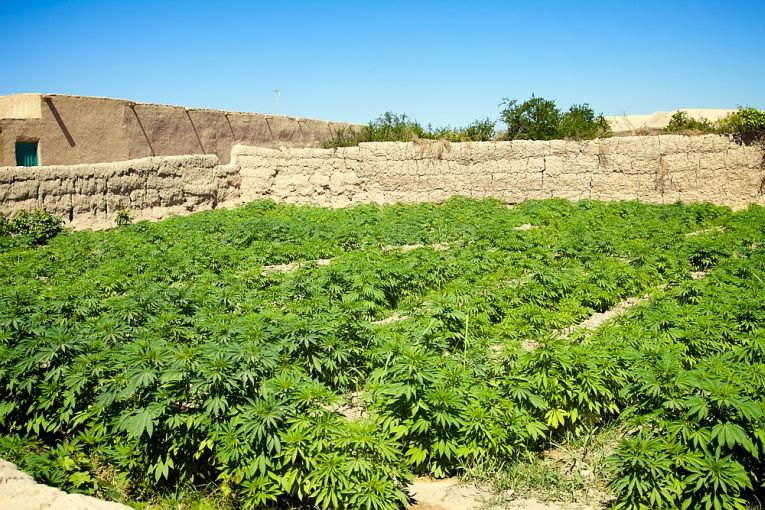Afghan image; Credit: © Shutterstock
The drug trade, and domestic drug abuse, are two of the most hotly debated topics in American politics right now. Many are calling for an end to the failed War on Drugs, in an attempt to slow down the population growth in our already overcrowded prisons. Meanwhile, conversations about legalizing (or at least decriminalizing) marijuana have reached a fever pitch.
In between these major arguments are a small but growing contingent of scientists who are worrying about some of the lesser-known harms of the international drug trade. When we focus not on partisan politics or on individual liberties, but rather on the scientific elements, it becomes clear that policing the use and abuse of illegal drugs is a moral gray area at best.
Case in point: the environmental impact of the drug trade. Even if you ignore the larger concerns about global warming and wholesale climate change, the many smaller, cumulative ways that drugs impact the natural world are getting harder to ignore.
Let’s take a look at what’s going on.
Worldwide Deforestation
The world’s rainforests have long been recognized as being particularly at risk for widespread deforestation. In recent years, though, the thinning of these forests has been found to be caused by a variety of factors, and one of them turns out to be the drug trade.
Traffickers in need of an out-of-the-way spot to stage their operations are drawn to rainforests. They’ll often clear sections of forest to use for hidden runways and even fields to grow their wares.
The cocaine trade is largely to blame. In Honduras, the rate of deforestation has almost tripled since 2011. Colombia hasn’t fared much better: it’s estimated that 21.5% of coca fields were built after chopping down primary forests. Michael Evans put out this article to describe the Colombian forest degradation by cocaine growers.
Carbon Emissions
Thanks in part to the work of the American Herbal Pharmacopeia, we’re approaching a more widespread acceptance of the health benefits of cannabis. It’s very obviously not without its risks and dangers, but the medical marijuana industry is taking off in a big way, with state governments across the country discussing legislation to make pot legal for medical purposes.
During the long decades of marijuana prohibition, however, we’ve largely ignored the mounting environmental concerns that come from illegal, off-the-grid cultivation operations. Indoor cultivation alone is responsible for releasing greenhouse gas emissions equivalent to about 3 million automobiles.
In states like Washington and Colorado, where recreational marijuana is legal, restrictions and regulations concerning the responsible cultivation of cannabis are in place, and will likely be refined further as time goes on. For the rest of the country, the question remains: if we achieve decriminalization and/or legalization, how will the environmental impact of legal cannabis operations be regulated?
Antibiotic-Resistant Bacteria
Of the many unseen harms posed by the international drug trade, the issue of antibiotic-resistant bacteria is likely among the most understood. Every year, more than four billion prescriptions are filled by Americans many of whom either fail to take the entire course of their medication or simply don’t know how to dispose of unused portions.
The results are disquieting. When unused prescription medications are thrown away or flushed down the toilet, they often enter the water table, where they influence the development of bacteria. Thanks to prolonged, low-level exposure to our discarded medications, harmful bacteria sometimes develop a resistance to the compounds meant to kill them. What this means is that, over time, our ability to fight even some of the most common ailments are being undermined. This process is responsible for some 65,000 deaths each year in the US.
The problem would likely be easier to contain if the only medications being improperly disposed of were legal ones. Unfortunately, the illegal prescription drug trade is booming, with cheap prescription drugs from Mexico crossing the border every day.
A Reminder to Seek Help
At this point, I’d be remiss if I didn’t remind you to seek help if you or someone you love is struggling with an addiction of any kind. The good news is that you have plenty of resources to help you fight the good fight. Recent studies have shown that exercise can help battle addiction. You can also check out the motivational books being recommended by your local treatment centers, as well as government resources to get you started.
At the end of the day, what we’re dealing with is clearly a global problem—and fighting it is going to require that we turn aside from unproductive political fights and stop with our relentless judgment of addicts. Only then will we be in a position to make real progress.










